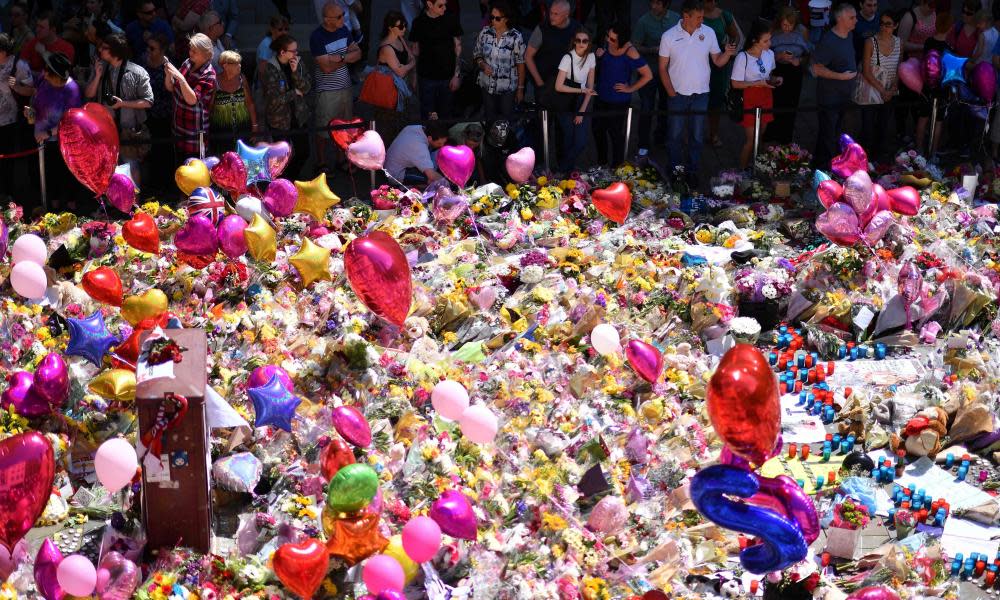‘Manchester has a sense of identity that you don’t find elsewhere. It’s a city that takes you in’

Vic Gilmore paused to wipe away a tear from underneath his sunglasses before bending down at the edge of a widening sea of floral tributes in Manchester city centre to place a laminated yellow card that read: “Madchester. Have it”.
“They’re just a few words that everyone knows from this city and sort of sum it up for a lot of people, I guess. I’m an old punk and take my inspiration from the mid-70s, but we’re all proud of what came out of this city in the 80s and 90s and it defines who we are,” said the musician and graphic designer.
In a community still reeling from the sudden and violent loss of 22 lives on Monday night, the gesture was just one among the thousands of personal memorials – often with the hint of a certain defiance – by the citizens of this most creative of British cities.
To that, add the thousands of acts of kindness, starting with those who reacted in the immediate aftermath of the suicide bombing at the Manchester Arena, whether taxi drivers who spent the night giving free lifts to those caught up in the bombing, or those who opened their homes under the Twitter hashtag #roomsformanchester to people who needed somewhere to go.
It has continued all week, morphing into help for the helpers themselves, ranging from food and refreshments for the emergency services and the armed police on the streets, through to attempts to raise money for the homeless Mancunians who rushed to Monday night’s victims – an appeal for Chris Parker, who ran towards the blast zone after Salman Abedi’s bomb detonated, had raised more than £50,000 by Saturday yesterday morning.
“The reaction here has been different in a way to London after attacks there. It’s true, although difficult to put your finger on it,” said Leanne Instralle, a Londoner turned Mancunian who had come down to the city centre to lay flowers she had been given for her 28th birthday.
In Manchester, hearts were worn firmly on sleeves and strangers had reached out to each other as a matter of course in the days since the atrocity, she said. Her friend, Joanna Radcliffe, from Nottingham but who now also calls Manchester home, added: “There is a sense of identity that you just don’t find elsewhere. I have been here for 10 years and there is nowhere else like it – it’s a city that takes you in and makes you feel part of it, even if you were not born here.”
At Manchester’s tattoo parlours, hundreds of people have been queueing to get bee inkings in a show of solidarity, donating £50 to help the families of those killed or injured. The worker bee, said to be a legacy of the city’s textile industry, is now seemingly ubiquitous, whether in graffiti stencilled on walls or in framed art in the front windows of high-end galleries, and usually accompanied by another longstanding term of civic pride: “I Love MCR.”
It’s a common sight amid the tributes in St Ann’s Square, the city centre location that has become the focus for Manchester’s remembrance and where the crowd broke into a spontaneous rendition of the Oasis anthem Don’t Look Back in Anger at the end of a minute’s silence on Thursday.
From underneath the statue of Richard Cobden, the radical Liberal statesman and co-founder of the Anti-Corn Law League, the expanse of flowers continues to grow, along with other items: balloons, teddy bears and football scarves of the city’s two big clubs as well as those of other towns in the Greater Manchester area.
Radcliffe, who heard the explosion on Monday night and saw people running from the arena where the concert by the American singer Ariana Grande had been taking place, said that she and Instralle had been coming back to the memorial since the one minute’s silence.
Another presence has been Elton Darlo, a 69-year-old former doorman, wrestler and street artist who has been sketching the scenes of remembrance using coloured ballpoint pens and pencils. “I’m going to donate them to charity afterwards,” said Darlo (known otherwise as Leslie Darlington), a familiar character to many in the city centre. “There is a deep resilience in this city and it’s kept people going in the past, whether it was in the blitz or during the IRA bombs.”
By Saturdayyesterday morning, as showers interrupted the heatwave, the first drops of rain were falling on the flowers and tributes, including the card left by Vic Gilmore. Along with the Manchester musical references, it contained a third line, adopted from the 1976 American film Network: “We’re mad as hell and we’re not going to take it any more.”
“The point I wanted to get across is that we’re mad at all the haters, no matter what side of the community they come from, but we’re still united,” he said.

 Yahoo News
Yahoo News 
